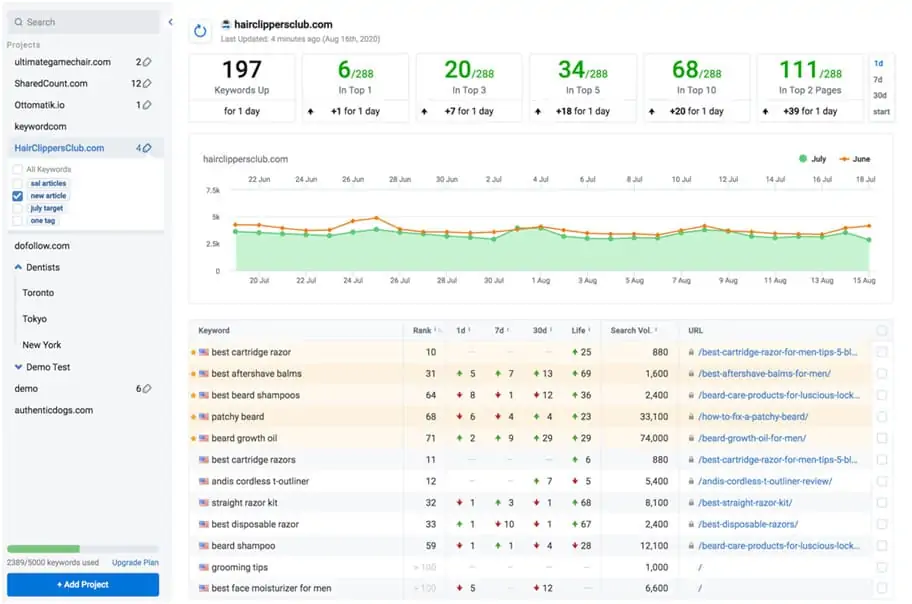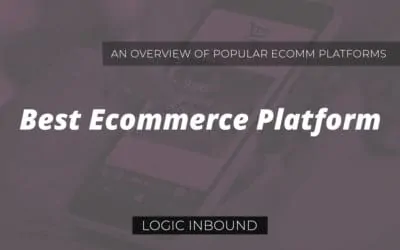Developing an effective SEO strategy involves a lot of different factors and “moving parts”. Most of the time, strategies need to be refined over time in order to achieve the best results. In order to know what to change about your strategy, you need to know which parts of it are working and which parts could be improved.
Tracking the performance of your SEO strategy is essential. However, it can often be difficult to know exactly what metrics to use to track performance. There are several KPIs—or Key Performance Indicators—that you can use to achieve this.
Many website owners and content creators are only aware of the most basic KPIs for SEO. One of these is search engine visibility, or how often their site appears on SERPs (Search Engine Results Pages) for specific keywords. Another is organic traffic—a broader metric of how many visitors a site gets from search results in general.
While these basic metrics (both of which can be seen using Google Search Console) are useful at providing a vague overview of how successful an SEO strategy is, you may want to know a little more information than just how many hits your site is getting. Many website owners, especially of business websites, want to know the performance of their sites in more detail!
If you want to delve deeper into SEO performance tracking, here are seven more metrics you can use to gain greater insight.
1. Monitor Search Rankings
The higher a website ranks for your chosen keywords, the more likely it is to receive higher traffic, and the higher your conversion rate (more on that later) will probably be. Less than 1% of search engine users click on links not on the first page, so high ranking is essential.
Of course, choosing the right keywords is also important—ranking highly in a keyword that is too specific and rarely searched for is less useful than a broader keyword that has a lot of searches.
When it comes to tracking your website rankings, you can monitor keyword rankings using an automated tool like keyword.com.
Source: Keyword.com
2. Organic CTR
Visibility and rankings on search engines are far from the be-all-and-end-all of an SEO strategy. After all, you want people to visit your site, not just see it pop up on their Google results!
This is where CTR—or Click-Through Rate—comes in. CTR refers to the ratio of search engine users who clicked on your site to those who simply saw it in their search engine results but did not click. CTR is one of the most effective KPIs for tracking web traffic.
3. Analytics
The term “analytics” refers to the measurement and analysis of data. Analytics can be used to measure web traffic and engagement from particular demographics, rather than simply measuring volume of traffic in general. This is extremely useful for marketing purposes—if you want to know how well your SEO strategy is performing with (for example) a particular age group, gender, or location, analytics is an extremely useful part of your toolkit. Over three quarters of marketers rely heavily on analytics.
There are plenty of analytics tools available online, but the most popular is Google Analytics, which provides free reports that can be used to gain valuable insight into the performance of SEO strategies.
Source: Google
4. Branded Traffic
Branded traffic is a specific type of web traffic from search engine users who search for specific keywords that include the name of your site, company, or any other chosen term that you use frequently in your marketing. Approximately 30% of traffic is branded traffic, with this percentage higher the more well-known a site or business is. Branded traffic is particularly useful for measuring your brand awareness among the public.
Like other KPIs, branded traffic can be tracked using Google Search Console. When your SEO strategy is part of a wider marketing strategy, branded traffic is one of your best friends!
Source: Google
5. Backlink Analysis
The importance of links in SEO is often underappreciated—in fact, almost 70% of web pages have no backlinks at all! Backlinks to your site are extremely useful in getting search engine algorithms to boost your search rankings. However, it is not simply a case of “the more links, the better”. Search engines like Google can actually penalize sites that have a large number of low-quality links!
A moderate number of high-quality links is best, but how can you measure this? Backlink analysis tools can be used to measure the link authority index (the higher the number, the better) of a website.
6. Conversion Rate / Bounce Rate
Conversion rate is an absolutely vital KPI when it comes to marketing. This metric represents what percentage of visitors to a website end up carrying out a particular desired action (usually purchasing an advertised product or service, or signing up for a mailing list or free trial). The average conversion rate is surprisingly low—around 2% at the time of writing!
Visitors who leave the site without carrying out this action make up a metric known as “bounce rate”—the opposite of a conversion rate. The higher the conversion rate and the lower the bounce rate, the better. If your site is attracting high levels of traffic but has a high bounce rate, this may indicate that the website’s content is not as effective as the rest of your SEO strategy. Both of these rates can be measured using Google Analytics.
7. Organic CPC
While Google offers paid PPC (or Pay-Per-Click) ad campaigns for driving traffic to your site, organic traffic is usually the goal of an SEO strategy. After all, over half of all traffic is organic. However, organic traffic does still come at a cost, if a less direct one. Each click on your site has what is known as an organic CPC (or Cost-Per-Click), which is a percentage of your SEO strategy’s budget. You can work out your organic CPC by dividing your website traffic by the total budget (including the cost of SEO tools, consultancy from experts, copywriters’ fees, etc) of your SEO strategy.
So, why is this a useful metric for tracking the performance of your strategy? The lower the CPC, the more effective your strategy. Over time, CPC should decrease as the performance of your SEO strategy increases!
Source: The Online Advertising Guide
How to know if your SEO strategy is working
In addition to these KPIs, there are also various other metrics that are often recommended.
One common and often recommended KPI is average session duration—or how long each visitor spends on your site. However, sometimes spending more time isn’t better. For example, a well-designed website with engaging written copy, appealing visual design, and an intuitive interface can mean visitors spend very little time before clicking that “Buy” button on the product or service you are selling. This is clearly not a bad thing!
On the contrary, poorly-designed websites can have visitors going back and forth between various links for a while but not actually buying anything. Pages-per-visit, another common KPI, is similar in this limitation.
A more effective way of measuring the overall success of an SEO strategy is ROI, or Return On Investment. To calculate ROI, you need to subtract the initial value of an investment from its final value, divide this resulting number by the investment’s cost, and finally multiply the result by 100.
Ultimately, ROI is the bottom line of any business strategy if you are looking to make a profit. By tracking and refining your SEO strategy based on the metrics described in this guide, you can increase the success of your business.







0 Comments